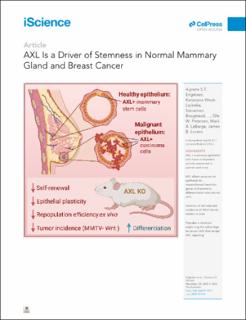AXL is a driver of stemness in normal mammary gland and breast cancer
Engelsen, Agnete; Wnuk-Lipinska, Katarzyna; Bougnaud, Sébastien; Vatter, Fanny A. Pelissier; Tiron, Crina Elena; Villadsen, René; Miyano, Masaru; Lotsberg, Maria Lie; Madeleine, Noëlly; Panahandeh, Pouda; Dhakal, Sushil; Tan, Tuan Zea; Peters, Stacey D'Mello; Grøndal, Sturla Magnus; Aziz, Sura Mohammed; Nord, Silje; Herfindal, Lars; Stampfer, Martha R.; Sørlie, Therese; Brekken, Rolf A; Straume, Oddbjørn; Halberg, Nils; Gausdal, Gro; Thiery, Jean Paul; Akslen, Lars A.; Petersen, Ole W.; LaBarge, Mark A.; Lorens, James
Journal article, Peer reviewed
Published version

Åpne
Permanent lenke
https://hdl.handle.net/11250/2753692Utgivelsesdato
2020Metadata
Vis full innførselSamlinger
- Department of Biomedicine [710]
- Registrations from Cristin [9791]
Sammendrag
The receptor tyrosine kinase AXL is associated with epithelial plasticity in several solid tumors including breast cancer and AXL-targeting agents are currently in clinical trials. We hypothesized that AXL is a driver of stemness traits in cancer by co-option of a regulatory function normally reserved for stem cells. AXL-expressing cells in human mammary epithelial ducts co-expressed markers associated with multipotency, and AXL inhibition abolished colony formation and self-maintenance activities while promoting terminal differentiation in vitro. Axl-null mice did not exhibit a strong developmental phenotype, but enrichment of Axl+ cells was required for mouse mammary gland reconstitution upon transplantation, and Axl-null mice had reduced incidence of Wnt1-driven mammary tumors. An AXL-dependent gene signature is a feature of transcriptomes in basal breast cancers and reduced patient survival irrespective of subtype. Our interpretation is that AXL regulates access to epithelial plasticity programs in MaSCs and, when co-opted, maintains acquired stemness in breast cancer cells.
